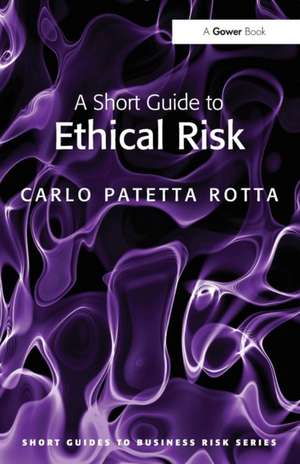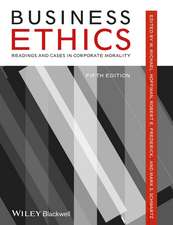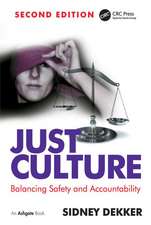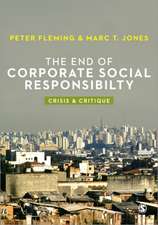A Short Guide to Ethical Risk: Short Guides to Business Risk
Autor Carlo Patetta Rottaen Limba Engleză Paperback – 28 apr 2010
| Toate formatele și edițiile | Preț | Express |
|---|---|---|
| Paperback (1) | 371.71 lei 3-5 săpt. | +22.67 lei 10-14 zile |
| Taylor & Francis – 28 apr 2010 | 371.71 lei 3-5 săpt. | +22.67 lei 10-14 zile |
| Hardback (1) | 1015.04 lei 6-8 săpt. | |
| Taylor & Francis – 13 noi 2017 | 1015.04 lei 6-8 săpt. |
Preț: 371.71 lei
Nou
Puncte Express: 558
Preț estimativ în valută:
71.13€ • 73.82$ • 59.46£
71.13€ • 73.82$ • 59.46£
Carte disponibilă
Livrare economică 22 februarie-08 martie
Livrare express 11-15 februarie pentru 32.66 lei
Preluare comenzi: 021 569.72.76
Specificații
ISBN-13: 9780566091728
ISBN-10: 0566091720
Pagini: 168
Dimensiuni: 138 x 216 x 9 mm
Greutate: 0.45 kg
Ediția:New ed.
Editura: Taylor & Francis
Colecția Routledge
Seria Short Guides to Business Risk
Locul publicării:Oxford, United Kingdom
ISBN-10: 0566091720
Pagini: 168
Dimensiuni: 138 x 216 x 9 mm
Greutate: 0.45 kg
Ediția:New ed.
Editura: Taylor & Francis
Colecția Routledge
Seria Short Guides to Business Risk
Locul publicării:Oxford, United Kingdom
Public țintă
Professional Practice & DevelopmentCuprins
Contents: Foreword; Preface; Introduction; Ethics according to economists; Ethics applied to economics; The roots of ethical uncertainty: a change in values; Ethical risk and how to manage it; Areas on which to focus efforts; Company functions responsible for monitoring and overseeing ethics; Tools to make companies more ethical; Conclusions.
Notă biografică
Carlo Patetta Rotta graduated from the University of Turin in 1994 with a degree in Business & Economics. He has worked within the auditing and control departments for several international organizations in business sectors from automotive to logistics and from real estate to pharmaceuticals and has experience of IT system and network controls. He has been involved in different countries on a number of international fraud-related cases and is currently practising in London. Patetta Rotta has specialised in internal auditing and he is accredited as a Certified Internal Auditor (CIA) by the Institute of Internal Auditors (IIA). He is accredited as a Certified Fraud Examiner (CFE) by the Association of Certified Fraud Examiners (ACFE). He is also accredited as a Certified Information System Auditor (CISA) by the Information Systems Audit and Control Association (ISACA). Patetta Rotta has published articles on ethics-related issues in a number of professional publications including The Internal Auditor, the magazine of the US Institute of Internal Auditors. Published articles and more information can be found at www.carlopatetta.com.
Recenzii
'It is a book for companies wishing to survive into the future...There are many books that cover ethics issues and many books that cover business issues, but Patetta manages to merge both.' - Jan Husdal, husdal.com 'Carlo does a wonderful job of relating ethics and risk to the global economy. Not only is he insightful, if we don’t pay attention to the guidance described in this book individual companies will be at a significant risk and the global economy will suffer.' - Roy Snell CCEP-Fellow, Chief Executive Officer, Society of Corporate Compliance and Ethics 'The doctrine that capitalism works simply through greed met its denouement in the Great Crash of 2008. An alternative view is re-emerging, that morality is irreducible to individual preferences and that it plays an essential role in cementing social relations, even in a capitalist economy. Carlo Patetta Rotta has produced a very useful practical guide to ethical issues within business.' - Professor Geoffrey M. Hodgson. University of Hertfordshire, UK.
Descriere
Written by a professional with diverse international experience in auditing and fraud, this guide provides an overview of the most significant theories of ethics that have impacted today's business world. It identifies the risks arising from a lack of attention to ethics, particularly in relation to governance, due diligence, reckless business models and other activity that increases exposure to fraud and corruption.





















